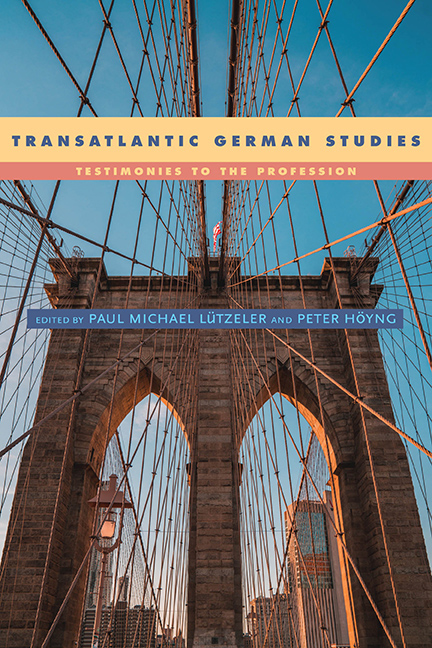Book contents
- Frontmatter
- Dedication
- Contents
- Acknowledgments
- Introduction
- From Erfahrungshunger to Realitätshunger: Futurity, Migration, and Difference
- In-between: The Participant as Observer—The Observer as Participant
- Transatlantic Space and My Own History of Globalization
- Deplazierte Personen: Why Would an American Become a Germanist?
- Metamorphoses and Meanderings of a Wanderer between Worlds
- German Studies as Vocation: My Path into It, Out of It, and Back into It
- My Long Way from Germanistik to Afro German Studies
- Mustang Red: My American Road to Critical Theory
- Third Place: How a French Germanist Became an Applied Linguist in America
- Transatlantic Exchanges: German Studies—European and American Style
- Being at Home in the Other: Thoughts and Tales from a Typically Atypical Germanist
- After Australia: Triangulating an Intellectual Journey
- A Tale in Translation: An Academic Itinerary from Istanbul to Bryn Mawr
- Beyond Passing: Transculturation in “Contact Zones”
- Far from Where? Germanistik between the Continents
- Epilogue: The Usefulness of Useless Studies
- Index
Far from Where? Germanistik between the Continents
Published online by Cambridge University Press: 14 February 2019
- Frontmatter
- Dedication
- Contents
- Acknowledgments
- Introduction
- From Erfahrungshunger to Realitätshunger: Futurity, Migration, and Difference
- In-between: The Participant as Observer—The Observer as Participant
- Transatlantic Space and My Own History of Globalization
- Deplazierte Personen: Why Would an American Become a Germanist?
- Metamorphoses and Meanderings of a Wanderer between Worlds
- German Studies as Vocation: My Path into It, Out of It, and Back into It
- My Long Way from Germanistik to Afro German Studies
- Mustang Red: My American Road to Critical Theory
- Third Place: How a French Germanist Became an Applied Linguist in America
- Transatlantic Exchanges: German Studies—European and American Style
- Being at Home in the Other: Thoughts and Tales from a Typically Atypical Germanist
- After Australia: Triangulating an Intellectual Journey
- A Tale in Translation: An Academic Itinerary from Istanbul to Bryn Mawr
- Beyond Passing: Transculturation in “Contact Zones”
- Far from Where? Germanistik between the Continents
- Epilogue: The Usefulness of Useless Studies
- Index
Summary
Childhood Gifts
NOT EVERYTHING, PERHAPS, comes as the result of pure choice; some things are a matter of timing and location.
I was born in Vienna, Austria, eight years after World War II ended. The city was occupied by Allied forces, but unlike Berlin, the city's center was not divided. Instead, the Allies took monthly turns in their administrative responsibilities. Politically, it was a precarious time. My family lived at the Stubenring, a less distinguished section of the city's most fashionable boulevard. The apartment was not ours. My father had rented a few rooms from a family who had arrived there from Hungary earlier. And there we were: my father, mother, maternal grandmother, and older sister who had left Poland as political refugees in 1949. Now, I was the last arrival to Vienna.
My birth certificate reflects my mother's false papers, which had helped her survive the last years of the war. Thus, my identity was and is quite questionable. One could easily argue that Liliane Weissberg does not exist at all. For the residents of the Stubenring, however, such circumstances were not the exception, but the rule. Many of the renters were Jewish refugees or returnees to Vienna, as I found out many years later when I began to study the Ringstrasse's history. At the turn of the century, the newly constructed avenue had attracted the newly established Jewish bourgeoisie and even upper class; by the early nineteen forties, most of these families had already emigrated or had been sent to concentration camps. Their apartments, still furnished at times, were rented to citizens loyal to the new National Socialist regime. After the war, some of these apartments changed hands again, and the former addresses of the Jewish wealthy became those of Jewish refugees who replaced, or became close neighbors of, former party members. I became part of this Viennese Jewish history.
My parents were Jews from the old Habsburg territory of Joseph Roth and Bruno Schulz. My mother's family hailed from Lwów, formerly Lemberg, the Austrian district capital of Galicia. My father, who was born in the nearby fortress town of Przemysl, had lived in Lwów, too; he had moved there to study physical chemistry at the Technical University.
- Type
- Chapter
- Information
- Transatlantic German StudiesTestimonies to the Profession, pp. 249 - 264Publisher: Boydell & BrewerPrint publication year: 2018



